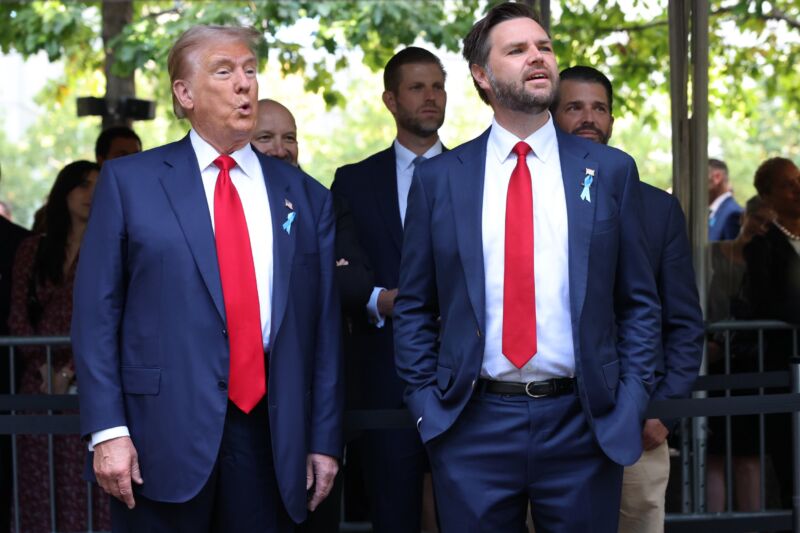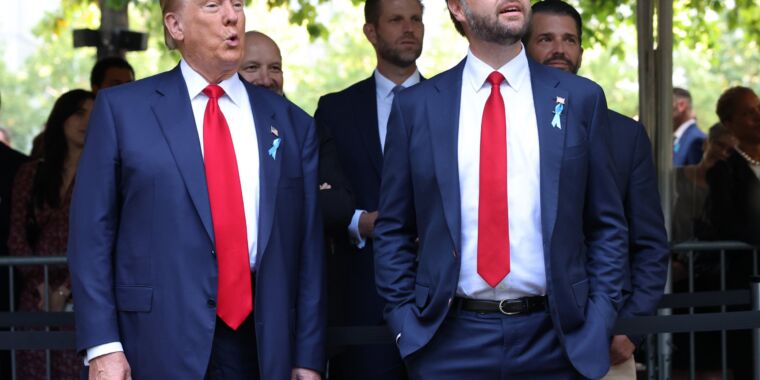
Getty Images | Michael M. Santiago
Elon Musk’s X is blocking links to the JD Vance “dossier” containing the Trump campaign’s research on the vice presidential nominee. X also suspended Ken Klippenstein, the journalist who published the dossier that apparently comes from an Iranian hack of the Trump campaign.
“Ken Klippenstein was temporarily suspended for violating our rules on posting unredacted private personal information, specifically Sen. Vance’s physical addresses and the majority of his Social Security number,” X’s safety account wrote yesterday. Klippenstein’s account was still suspended as of this writing.
X is blocking attempts to post links to the Klippenstein article in which he explained why he published the leaked dossier. An error message says, “We can’t complete this request because the link has been identified by X or our partners as being potentially harmful.”
Klippenstein’s article explains that the “dossier has been offered to me and I’ve decided to publish it because it’s of keen public interest in an election season. It’s a 271-page research paper the Trump campaign prepared to vet now vice presidential candidate JD Vance.”
The article doesn’t contain Vance’s address or Social Security number, but it provides a download link for the dossier. Klippenstein published another article yesterday after his X suspension, writing that he stands by his decision not to redact Vance’s private information. But the version of the Vance dossier available on Klippenstein’s website today has redactions of addresses and his Social Security number.
“I never published any private information on X”
“Self-styled free speech warrior Elon Musk’s X (Twitter) banned me after I published a copy of the Donald Trump campaign’s JD Vance research dossier,” Klippenstein wrote. “X says that I’ve been suspended for ‘violating our rules against posting private information,’ citing a tweet linking to my story about the JD Vance dossier. First, I never published any private information on X. I linked to an article I wrote here, linking to a document of controversial provenance, one that I didn’t want to alter for that very reason.”
Klippenstein also wrote, “We should be honest about so-called private information contained in the dossier and ‘private’ information in general. It is readily available to anyone who can buy it. The campaign purchased this information from commercial information brokers.”
US intelligence agencies said last week that “Iranian malicious cyber actors” have been sending “stolen, non-public material associated with former President Trump’s campaign to US media organizations.” This is part of a strategy “to stoke discord and undermine confidence in our electoral process,” US agencies said. Most media outlets decided not to publish the materials.
Musk slammed Twitter’s Hunter Biden decision
Elon Musk claimed that he bought Twitter in order to protect free speech, and he criticized the social network for an October 2020 incident in which Twitter blocked a New York Post story about Hunter Biden’s emails for allegedly violating a policy against posting hacked materials.
“Suspending the Twitter account of a major news organization for publishing a truthful story was obviously incredibly inappropriate,” Musk wrote in April 2022, one day after he struck a deal to buy Twitter for $44 billion. After completing the purchase, Musk leaked so-called “Twitter Files” containing the company’s internal deliberations about the Hunter Biden laptop story and other matters.
Twitter’s Hunter Biden decision drew immediate criticism when it happened, and the company changed its hacked materials policy just one day later. Under the October 2020 policy change, Twitter said it would stop removing hacked content unless it was directly shared by hackers or those acting in concert with them and that it would label tweets to provide context instead of blocking links from being shared on Twitter.
“Straight blocking of URLs was wrong, and we updated our policy and enforcement to fix,” Jack Dorsey, Twitter’s former CEO, wrote at the time. “Our goal is to attempt to add context, and now we have capabilities to do that.”
The hacked materials policy was still active as of January 2024, but the policy page no longer exists.
Meanwhile, The New York Times examined five days’ worth of Musk’s X posts in an article published today. In 171 posts and reposts during that frenetic five-day period, the tech mogul railed against illegal immigration, boosted election fraud conspiracy theories and attacked Democratic candidates, according to a New York Times analysis… Nearly a third of his posts last week were false, misleading or missing vital context. They included misleading posts claiming Democrats were making memes ‘illegal’ and falsehoods that they want to ‘open the border’ to gain votes from illegal immigrants,” the article said.

